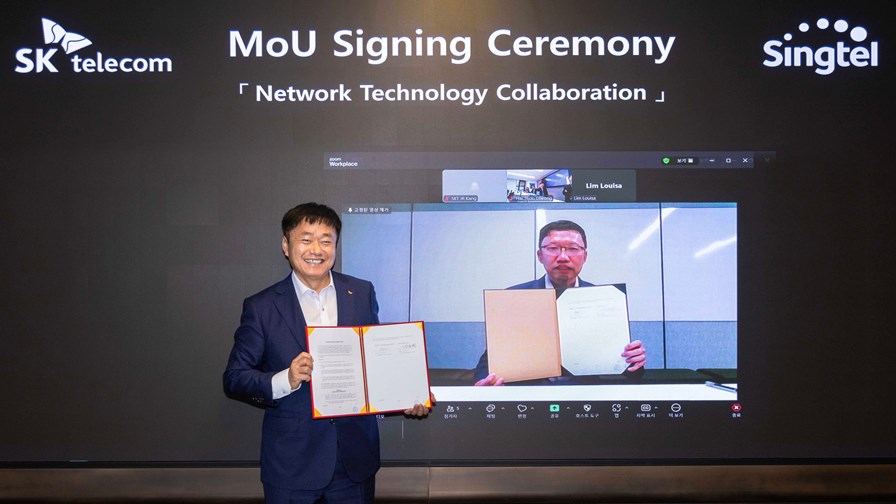
From left to right: Kang Jong-ryeol, Head of ICT Infrastructure, SK Telecom; Tay Yeow Lian, Managing Director, Networks, Singtel.
- Singtel and SK Telecom are already working closely together
- Now they have formalised their collaboration with a memorandum of understanding (MoU) related to next-generation networks R&D
- AI, automation, orchestration, APIs, slicing and disaggregation are at the heart of the partnership as the telcos look towards the 6G era
Singtel and SK Telecom, two of the world’s most progressive and innovative telcos, have formalised their already close relationship by signing a memorandum of understanding (MoU) that will see them work together on “networks that will drive innovation, improve network performance and security, and deliver enhanced customer experiences over the next two years.”
The duo are already members of the Global Telco AI Alliance (GTAA) – along with Deutsche Telekom, e& and SoftBank – which is developing telco-specific large language models (LLMs): The members recently signed a joint venture (JV) agreement at the DTW24 event in Copenhagen.
And AI is at the heart of the pair’s new agreement. The telcos plan to “explore the use of artificial intelligence (AI), orchestration tools, and deepen the domain knowledge of network virtualisation and other technologies [that are] central to laying the necessary building blocks for progressing to 6G,” they noted in an announcement about the MoU.
As part of their R&D efforts, they will explore the potential of “edge-AI infrastructure, which reduces the computational burden concentrated on the cloud through edge computing and performs AI inference by combining AI solutions. This initiative is expected to not only enhance connectivity but also provide customers with unique AI service offerings and enable the operators to restore services faster, thus improving the customer experience,” noted the partners.
The combination of distributed computing, AI and telecom network functionality is something that’s attracting increasing attention in the industry. Just recently, test and measurement vendor Rohde & Schwarz became the latest company to join the AI-RAN Alliance, an industry body formed earlier this year (with Nvidia front and centre) that believes future radio access network (RAN) architectures need to be revamped to enable multiple, demanding workloads to run on a single platform – see AI-RAN Alliance launches at #MWC24.
Other particular areas of focus for the partners include:
Network APIs: The pair plan to jointly develop APIs that conform to the GSMA’s Open Gateway specifications. Singtel has already developed Paragon, an edge and cloud resource management platform that enables enterprises to tap into network functions via APIs. This has already been integrated into the network API aggregation platform developed by Ericsson’s Vonage operation.
Network orchestration: With an eye on the increasing complexity that the 6G era will bring, they will jointly develop orchestration systems that can “better automate and coordinate various network functions and streamline service delivery seamlessly and efficiently.” Singtel has already developed such a platform called Cube (or CUBΣ), which the operator describes as a network-as-a-service (NaaS) platform that makes it easier for enterprises to subscribe to and manage multiple services from multiple suppliers “as well as gain insights on network utilisation, workload performance and sustainability metrics via a single sign-on digital portal.”
Network slicing: The partners will “explore various implementations of activating dedicated, customised slices of their networks that will better meet the diverse and dynamic demands of society and industry.”
RAN disaggregation: Using Singtel’s end-to-end telco cloud platform, the telco duo will “aim to develop a fully disaggregated mobile network, which will provide a more flexible, cost-effective, and scalable approach to network design and management”
Automation: The partners will “further explore the capabilities of automation and AI to enhance operational efficiency and sharpen service responsiveness, which will set the foundations for a 6G era.”
The MoU was signed by Kang Jong-ryeol, SK Telecom’s head of ICT Infrastructure, and Tay Yeow Lian, Singtel’s managing director of networks.
Kang Jong-ryeol, head of ICT Infrastructure, SK Telecom, said, “The collaboration between SKT and Singtel marks a significant first step in shaping the future of the global telecommunications industry," stated Jong-ryeol. “By combining the strengths of both companies, we aim to achieve significant advancements in next-generation communication technologies such as 6G and AI infrastructure."
Singtel’s Tay Yeow Lian added: “As a global leader in 5G technology, we’re keen to capitalise on the myriad of capabilities this technology has to offer, especially in the areas of network slicing and with the inclusion of AI. With SKT, we’re looking to not only enhance the experience of our customers but to also drive industry innovation and help us prepare for the evolution to 6G.”
And to help with that industry innovation, the partners plan to publish a whitepaper on their “advancements in areas such as virtualisation, slicing and network evolution that can help other telcos globally to capitalise on the capabilities of 5G and to prepare for 6G.”
- Ray Le Maistre, Editorial Director, TelecomTV
Email Newsletters
Sign up to receive TelecomTV's top news and videos, plus exclusive subscriber-only content direct to your inbox.




